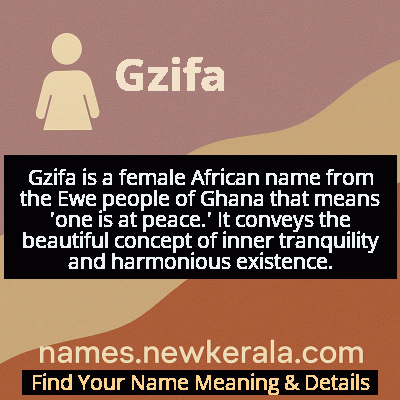Gzifa Name Meaning & Details
Origin, Popularity, Numerology Analysis & Name Meaning of Gzifa
Discover the origin, meaning, and cultural significance of the name GZIFA. Delve into its historical roots and explore the lasting impact it has had on communities and traditions.
Name
Gzifa
Gender
Female
Origin
African
Lucky Number
4
Meaning of the Name - Gzifa
Gzifa is a female African name from the Ewe people of Ghana that means 'one is at peace.' It conveys the beautiful concept of inner tranquility and harmonious existence.
Gzifa - Complete Numerology Analysis
Your Numerology Number
Based on Pythagorean Numerology System
Ruling Planet
Uranus (Rahu)
Positive Nature
Strong sense of order, loyal, practical, and disciplined.
Negative Traits
Stubborn, overly serious, rigid, and prone to feeling restricted.
Lucky Colours
Blue, gray.
Lucky Days
Saturday.
Lucky Stones
Blue sapphire.
Harmony Numbers
1, 7, 8.
Best Suited Professions
Managers, engineers, accountants, organizers.
What People Like About You
Dependability, discipline, practicality.
Famous People Named Gzifa
Gzifa Adzraku
Community Leader
Founded women's peace initiative in Volta Region promoting conflict resolution
Gzifa Agbenyega
Educator
Established literacy programs for rural Ghanaian children
Gzifa Dzramado
Cultural Preservationist
Documented and preserved traditional Ewe naming ceremonies
Name Variations & International Equivalents
Click on blue names to explore their detailed meanings. Gray names with will be available soon.
Cultural & Historical Significance
Historically, names like Gzifa served as reminders of societal ideals and collective aspirations. In Ewe cosmology, peace is not merely the absence of conflict but an active state of balance between individuals, communities, and the spiritual world. The preservation of such names represents resistance against cultural erosion and a conscious effort to maintain indigenous knowledge systems. In contemporary Ghana, Gzifa stands as a symbol of cultural resilience and the enduring relevance of traditional wisdom in modern society, bridging ancestral values with present-day realities.
Extended Personality Analysis
Women named Gzifa typically exhibit personality traits centered around emotional equilibrium, diplomacy, and compassionate leadership. Their calm presence often has a soothing effect on others, making them natural peacemakers in both personal and professional settings. They possess exceptional listening skills and the ability to understand multiple perspectives, which enables them to resolve conflicts with wisdom and fairness. This innate diplomatic ability is complemented by strong intuition that helps them navigate complex social dynamics and emotional landscapes. Their peaceful nature should not be mistaken for passivity—Gzifas demonstrate remarkable inner strength and resilience when facing challenges.
In relationships, Gzifas are known for their loyalty, empathy, and ability to create safe emotional spaces for others. They value deep, meaningful connections over superficial interactions and often serve as the emotional cornerstone of their families and communities. Professionally, they excel in roles that require mediation, counseling, teaching, or community building. Their thoughtful approach to decision-making and natural grace under pressure makes them effective leaders who inspire trust and cooperation. While generally gentle and accommodating, Gzifas maintain strong personal boundaries and principles, demonstrating that true peace comes from balanced self-awareness rather than mere compliance.
Modern Usage & Popularity
In modern times, Gzifa maintains its traditional usage within Ewe communities in Ghana, Togo, and Benin while also appearing among diaspora populations in Europe and North America. The name has experienced a modest revival as part of the broader cultural renaissance movement celebrating African heritage and identity. While not ranking among popular baby names in global databases, it holds significant cultural value for families seeking to preserve their Ewe heritage. In urban centers like Accra and Lomé, educated parents are increasingly choosing traditional names like Gzifa to counter Western naming trends and reinforce cultural pride. The name's usage reflects a conscious decision to maintain linguistic and cultural continuity in an increasingly globalized world. Social media and digital communities have also facilitated greater awareness and appreciation of such traditional names beyond their original cultural contexts.
Symbolic & Spiritual Meanings
Symbolically, Gzifa transcends its literal meaning to represent profound concepts of harmony, balance, and spiritual wholeness. It embodies the metaphorical calm after life's storms—the stillness that allows for reflection, healing, and renewed purpose. The name carries the symbolism of the baobab tree's deep roots and wide branches, representing both inner stability and expansive compassion. In African philosophical context, Gzifa represents the essential balance between individual wellbeing and communal welfare, reflecting the Ubuntu principle that 'I am because we are.' The name also symbolizes the bridge between tradition and modernity, serving as a living reminder that ancient wisdom about peaceful coexistence remains relevant in contemporary society. Furthermore, it represents the concept of 'Sankofa'—learning from the past to build a peaceful future—making it not just a personal attribute but a collective aspiration.

